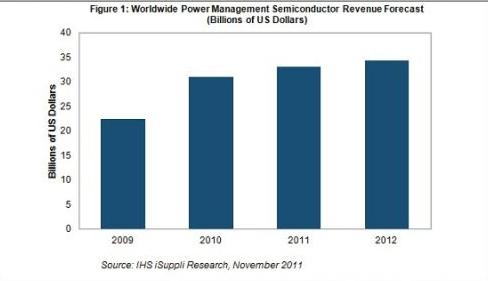 According to IHS iSuppli’s power management market research report, due to the overall softening of consumer spending and the disruption of the supply chain caused by the March earthquake in Japan, the growth rate of the power management semiconductor market in 2011 will be slower than expected.
According to IHS iSuppli’s power management market research report, due to the overall softening of consumer spending and the disruption of the supply chain caused by the March earthquake in Japan, the growth rate of the power management semiconductor market in 2011 will be slower than expected. In 2011, revenue from semiconductor power management was estimated to be 33.1 billion U.S. dollars, an increase of 6.7% from 31 billion U.S. dollars in 2010, and the growth rate was much lower than 37.8% in 2010. The market is expected to grow slightly by 3.9% to $34.4 billion next year, as shown in Figure 1.
Power management semiconductors are critical to ensure the stable operation of electronic systems. The decline in the market's growth rate this year is mainly due to the influence of two factors. Many semiconductor factories are located in Japan, and the March earthquake caused disruption of production in some parts of the country and the power management semiconductor market slowed down. By September, the situation in Japan had basically returned to normal, but the power management semiconductor market faced another problem immediately - consumer spending began to decline from the middle of the year. IHS believes that consumer spending may not begin to improve until the second half of 2012.
In the third quarter, consumer tightening expenditures have led to a slowdown in revenue growth in the power management semiconductor market, which was a growth rate of only 2.3% from the previous quarter, compared to 8.8% in the third quarter of last year. Forecasts show that the market's demand for popular consumer electronic products such as mobile phones and mobile computing devices has decreased, so it is expected that the situation will not improve in the fourth quarter. Mobile phones and mobile computing devices are two major factors driving the growth of the power management semiconductor industry.
The best performing areas in the next five years In spite of the current slowdown in the semiconductor market for power management, overall operating revenue will continue to grow over the next five years, with an average increase of 7.2%.
The best area for the future will be the inverter, which is expected to grow from $4.2 billion in 2010 to $7.5 billion in 2015. Inverters are used to convert direct current into alternating current, and many markets will require highly efficient inverters, including automobiles, solar and wind turbines, motor control in electrical appliances, and manufacturing automation.
Other areas for growth in the semiconductor power market in the next five years drive power management include mobile, communications, energy and public infrastructure improvement projects, new and alternative energy sources such as hybrid and electric vehicles, wind and solar energy, and devices that will affect smart meters, etc. The grid upgrade. Micro-inverters will be particularly eye-catching and will be one of the fastest growing areas in the entire power management industry. The micro-inverter is dedicated to 200W solar applications.
From a variety of equipment perspectives, the growth in the media tablet will be the strongest. It is expected that the compound annual growth rate of power management semiconductors in this field will reach 63.3%, and the second fastest growth rate is the server market, which is only 12.0%. Other important equipment areas will be building and home control, notebooks, enterprise voice networks, mobile infrastructure and medical electronics. For all of these areas, MOSFETs represent a major growth opportunity, followed by high-voltage MOSFETs and switching regulators.
As consumer demand resumes after 2014, expenditures will also increase. By then, it will have a positive impact on the power management semiconductor industry. The operating income growth rate is expected to increase to 8.7%.
Marijana Vukicevic is the chief analyst of power management at IHS.
Standard Cable Ties Co., Ltd. , http://www.nscableties.com